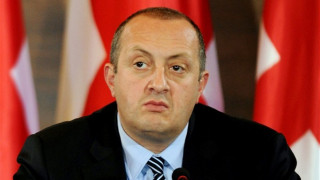Verdict: Giorgi Margvelashvili’s statement is MOSTLY TRUE.
Resume: When the third President of Georgia, Mikheil Saakashvili, was found guilty by Tbilisi City Court of abusing his right to pardon, an active discussion started about a president’s right to pardon as granted to the office by the Constitution of Georgia. A bitter controversy has further ensued around President Giorgi Margvelashvili’s pardoning of inmates. The incumbent President stated that certain powers were using those facts to personally discredit both him and the institute of the presidency in general. Mr Margvelashvili spoke about the issue of the statistics of presidential pardons on air on the Public Broadcaster and noted that Mikheil Saakashvili pardoned many more individuals as compared to him.
FactCheck learned that during his two terms of presidency from 2004-2014, Mikheil Saakashvili pardoned 34,947 persons in total whilst Giorgi Margvelashvili pardoned 3,861 individuals in 2013-2018.
Analysis
The President of Georgia, Giorgi Margvelashvili, on air on the Public Broadcaster, talked about the issue of the presidential pardon and stated: “I have counted and found out that the previous president pardoned 35,000 persons whilst I pardoned 3,500.”
The right to grant pardon to convicts is the right of the President of Georgia enshrined in Article 73 of the Constitution of Georgia. The President of Georgia grants pardons to specific individuals based on the Constitution of Georgia and Article 78 of the Criminal Code of Georgia. The act of pardon may free a convict from further serving his term in prison or the punishment might be cut short or changed into a milder one. Of importance is that a convict’s criminal record can be cleared by presidential pardon. The rule governing the granting of pardons is regulated by a decree of the President of Georgia issued on 27 March 2004.
Recently, the issue of pardoning has become the subject of a rigorous controversy as a result of several important circumstances. The hot debates around the issue of pardoning were launched after Tbilisi City Court’s decision to find the third president of Georgia, Mikheil Saakashvili, guilty of abusing his authority; particularly, his right to grant pardons. The incumbent President of Georgia decried this fact as a deliberate restriction of a president’s constitutional right and the weakening of his prerogatives.
The pardoning controversy did not end with this. It was followed by Irakli Koridze’s case. He was arrested on 2 April 2018 on charges of smuggling and storing a large amount of drugs in Georgia as a part of an organised group. Parliamentary Majority member, Davit Matikashvili, stated that Irakli Koridze had previously been pardoned by the incumbent President of Georgia. The MP stated: “This individual was tried by the court in 2011 on charges of smuggling and storing 300 subotex tablets. He was sentenced to 30 years in prison. In 2013, as a result of the Act of Amnesty, his prison term was cut by one-fourth. In 2014, he was released from prison not because of the amnesty but as a result of the President’s decision to grant him a pardon.” There were also rumours about Irakli Koridze and Giorgi Margvelashvili being related. The President of Georgia did not confirm these facts and the Head of the Pardon Commission referred to these rumours as deliberate attacks against the President and the Pardon Commission.
The pardoning controversy did not end with Koridze’s case either. On 13 April 2018, a horrific crime was committed on Barnovi Street in Tbilisi when a young woman was killed in front of her children. It was found that the murderer, who was the victim’s former stepfather and who served a prison term for assault on his wife and a car accident, had been recently pardoned by the incumbent president. The President of Georgia made a respective clarification for the public: “In August 2014, the individual assaulted his spouse. However, at that time he was not arrested. He was arrested after four and a half months because of a car accident and was then sentenced for both crimes. The convict then addressed the Pardon Commission and was rejected. His second plea to the Pardon Commission was accompanied by the positive references of a psychologist and a social worker of the penitentiary facility together with medical examination results which indicated that he did not have any psychological disorders. The convict’s statement of his pleading guilty and a description of him as the father of four children were also attached. The family was expressively supportive to have the convict released.”
It was during discussions about the aforementioned facts of pardoning when the President of Georgia stated that he had pardoned much fewer people as compared to Mikheil Saakashvili.
FactCheck contacted the Administration of the President of Georgia in order to obtain information about presidential pardons. In accordance with the information we received, the Pardon Commission of the President of Georgia was convened 45 times from January 2004 to 17 November 2013 during Mikheil Saakashvili’s two terms of presidency. He granted a total of 34,947 pardons to convicts and persons who had already served their prison terms. Of these, the majority at 22,920 persons were released from serving their main and ancillary punishments and their criminal records were cleared as a result of four decrees issued in October-November 2013.
In regard to the incumbent President, Giorgi Margvelashvili has pardoned 3,861 convicts and persons who have served their terms in prison since 17 November 2013. Twelve sessions of the Pardon Commission were convened during his one term of presidency.
Tags:







